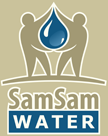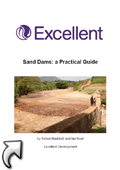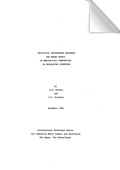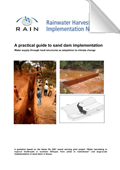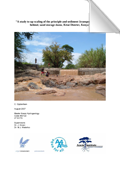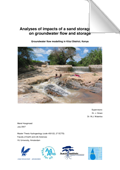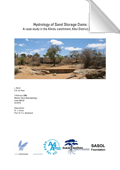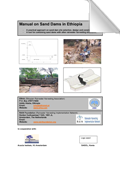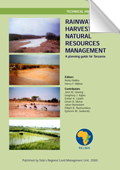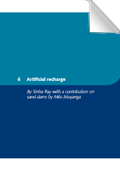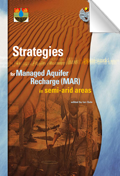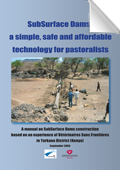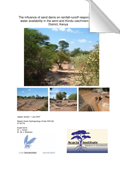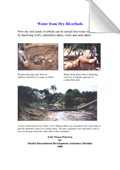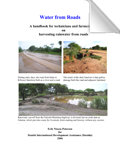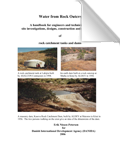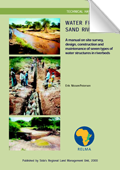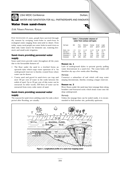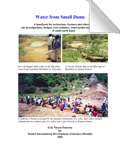
Filter by category
Or search
Loading search form...
Explanation
SamSamWater makes information on water and sanitation easy to find and accessible for all. This page contains a database with practical information, data and (GIS)maps.
We believe information should be shared to make water and sanitation projects more successful. The information in the database is gathered from numerous sources, such as research institutes, companies, NGOs and government organisations.
Do you have information we can integrate into this database, or if you have comments or questions, please contact us!
22 items found within the categories:
Infiltration and artificial recharge
Clear search filter.
Simon Maddrell and Ian Neal, Excellent Development (2012)
E.H. Hofkes and J.T. Visscher, International Reference Centre for Community Water Supply and Sanitation The Hague, The Netherlands (1986)
RAIN Foundation, RAIN Foundation ()
Cedrick Gijsbertsen, VU (2007)
Merel Hoogmoed, VU (2007)
Lucas Borst, Sander de Haas, VU (2006)
ERHA, RAIN Foundation, ()
Nuhu Hatibu, Henry F. Mahoo, Sida's Regional Land Management Unit (2000)
Jo Smet, Christine van Wijk, IRC (2002)
NWP, NWP (2007)
Ian Gale, UNESCO International Hydrological Programme, IAH (2005)
VSF-Belgium, VSF-Belgium (2006)
Jasper Jansen, VU (2007)
Erik Nissen-Petersen, DANIDA (2006)
Erik Nissen-Petersen, DANIDA (2006)
Erik Nissen-Petersen, DANIDA (2006)
Erik Nissen-Petersen, Sida's Regional Land Management Unit (2000)
Erik Nissen-Petersen, WEDC Conference (1997)
Erik Nissen-Petersen, DANIDA (2006)
Infiltration and artificial recharge
Clear search filter.
Sand Dams: a Practical Guide
Simon Maddrell and Ian Neal, Excellent Development (2012)
This manual describes the process of siting, design, construction and management of sand dams. It is aimed at technical and programme management staff working in arid and semi-arid lands who are interested in trialling the application of sand dams in new areas. The manual draws upon the experience of constructing sand dams in Kenya, where the majority of the world’s sand dams are located. Its primary purpose is to capture this experience. (source)
Artificial groundwater recharge for water supply of medium-size communities in developing countries
E.H. Hofkes and J.T. Visscher, International Reference Centre for Community Water Supply and Sanitation The Hague, The Netherlands (1986)
This document integrates material selected from many sources, both published and unpublished. The focus is on potential application of artificial groundwater recharge for water supply of medium-size communities.
The purpose of this document is to provide planners and engineers with practical information to assess the potential for application of artificial groundwater recharge schemes in rural water supply programmes or projects. (source)
The purpose of this document is to provide planners and engineers with practical information to assess the potential for application of artificial groundwater recharge schemes in rural water supply programmes or projects. (source)
A practical guide to sand dam implementation
RAIN Foundation, RAIN Foundation ()
Water supply through local structures as adaptation to climage change (source)
A study to upscaling of the principle and sediment transport processes behind sand storage dams, Kitui District, Kenya
Cedrick Gijsbertsen, VU (2007)
A study on the upscaling of the sand storage dam and the sedimentation processes that occur in the surroudings of the sand storage dam. (source)
Serie:
Sanddam.org Sand storage dams reports (all items in this serie)
Categories:
Rainwater harvesting
Infiltration and artificial recharge
Groundwater hydrology
Sanddam.org Sand storage dams reports (all items in this serie)
Categories:
Rainwater harvesting
Infiltration and artificial recharge
Groundwater hydrology
Akvopedia from Akvo.org
Wikipedia-like knowledgebase on water and sanitation. Contains many useful smart and affordable technical solutions and effective approaches.
Analyses of impacts of a sand storage dam on gw flow and storage
Merel Hoogmoed, VU (2007)
(source)
Serie:
Sanddam.org Sand storage dams reports (all items in this serie)
Categories:
Rainwater harvesting
Infiltration and artificial recharge
Groundwater hydrology
Sanddam.org Sand storage dams reports (all items in this serie)
Categories:
Rainwater harvesting
Infiltration and artificial recharge
Groundwater hydrology
Appropedia
Wikipedia-like knowledgebase on collaborative solutions in sustainability, poverty reduction and international development. Including sections on Water and Health.
Hydrology of Sand Storage Dams - A case study in the Kiindu catchment, Kitui District, Kenya
Lucas Borst, Sander de Haas, VU (2006)
This report reflects the results of a research project concerning the hydrology around sand storage dams. The Kitui district is one of the arid and semi-arid lands of Kenya. For (drinking)water most people heavily rely on water supply from the riverbeds of ephemeral rivers. SASOL is a local NGO which builds so called sand storage dams in ephemeral rivers to increase the water availability during the dry season. Sand storage dams are small (generally a few meters high) dams built in the riverbed behind which sand accumulates, enlarging the natural aquifer. The groundwater in the riverbed is obstructed by the dam and retained between the pores in the sand, making it available for people and animals during the dry season. (source)
Serie:
Sanddam.org Sand storage dams reports (all items in this serie)
Categories:
Rainwater harvesting
Infiltration and artificial recharge
Groundwater hydrology
Sanddam.org Sand storage dams reports (all items in this serie)
Categories:
Rainwater harvesting
Infiltration and artificial recharge
Groundwater hydrology
Manual on Sand Dams in Ethiopia
ERHA, RAIN Foundation, ()
A practical approach on sand dam site selection, design and construction. A tool for combining sand dams with other rainwater harvesting structures. (source)
Rainwater harvesting for natural resources management; A planning guide for Tanzania
Nuhu Hatibu, Henry F. Mahoo, Sida's Regional Land Management Unit (2000)
A planning handbook that provides planners with practical tips on how rainwater harvesting can form an integrated part of district development efforts. The book also gives practical guidelines in the planning steps required to incorporate rainwater harvesting in development plans, and shows how to implement them in the farmers’ context. (source)
Serie:
RELMA Technical Handbook Series No. 22 (all items in this serie)
Categories:
Technology and techniques
Rainwater harvesting
Roofwater harvesting
Infiltration and artificial recharge
RELMA Technical Handbook Series No. 22 (all items in this serie)
Categories:
Technology and techniques
Rainwater harvesting
Roofwater harvesting
Infiltration and artificial recharge
SandDam.org
All you need to know about sand storage dams.
Small Community Water Supplies: Artificial recharge (chapter 6)
Jo Smet, Christine van Wijk, IRC (2002)
(source)
Serie:
Small Community Water Supplies: Technology, people and partnership (all items in this serie)
Categories:
Technology and techniques
Infiltration and artificial recharge
Small Community Water Supplies: Technology, people and partnership (all items in this serie)
Categories:
Technology and techniques
Infiltration and artificial recharge
Smart Water Harvesting Solutions
NWP, NWP (2007)
This booklet on Smart Water Harvesting describes a number of creative solutions in situations where ‘there seems to be no water’. It shows practical efforts to ‘create water’, especially in drought prone areas. It does not limit itself to the act of harvesting, but includes ‘capturing’ water during periods of rain, so that it is available for periods of drought. Many of the technologies highlighted in this booklet are traditional, but neglected in the modern world, as people try to become less dependent on the wiles of nature. There is an increasing awareness that rather than fighting against nature, people should co-operate with it. That is what water harvesting tries to do.
Like its equivalents on Smart Water and Smart Sanitation, this book gives examples that have proven to be effective and affordable. The book is an effective source of inspiration for local communities, civil engineers, NGOs, research institutes, donors and governments. (source)
Serie:
Smart water solutions (all items in this serie)
Categories:
Technology and techniques
Rainwater harvesting
Roofwater harvesting
Infiltration and artificial recharge
Smart water solutions (all items in this serie)
Categories:
Technology and techniques
Rainwater harvesting
Roofwater harvesting
Infiltration and artificial recharge
Strategies for Managed Aquifer Recharge (MAR) in semi-arid areas
Ian Gale, UNESCO International Hydrological Programme, IAH (2005)
The document provides insight into implementing and managing aquifer recharge (MAR) as part of wider water management strategies and, together with other UNESCO-IAH activities. (source)
SubSurface Dams: a simple, safe and affordable technology for pastoralists
VSF-Belgium, VSF-Belgium (2006)
A manual on SubSurface Dams construction
based on an experience of Vétérinaires Sans Frontières
in Turkana District (Kenya) (source)
The influence of sand dams on rainfall-runoff response and water availability
Jasper Jansen, VU (2007)
(source)
Serie:
Sanddam.org Sand storage dams reports (all items in this serie)
Categories:
Rainwater harvesting
Infiltration and artificial recharge
Surface water hydrology
Groundwater hydrology
Sanddam.org Sand storage dams reports (all items in this serie)
Categories:
Rainwater harvesting
Infiltration and artificial recharge
Surface water hydrology
Groundwater hydrology
Water from Dry Riverbeds
Erik Nissen-Petersen, DANIDA (2006)
How dry and sandy riverbeds can be turned into water sources by hand-dug wells, subsurface dams, weirs and sand dams (source)
Serie:
Water for Arid Lands Book 3 (all items in this serie)
Categories:
Technology and techniques
Rainwater harvesting
Infiltration and artificial recharge
Water for Arid Lands Book 3 (all items in this serie)
Categories:
Technology and techniques
Rainwater harvesting
Infiltration and artificial recharge
Water from roads
Erik Nissen-Petersen, DANIDA (2006)
A handbook for technicians and farmers on harvesting rainwater from roads (source)
Serie:
Water for Arid Lands Book 6 (all items in this serie)
Categories:
Technology and techniques
Rainwater harvesting
Infiltration and artificial recharge
Water for Arid Lands Book 6 (all items in this serie)
Categories:
Technology and techniques
Rainwater harvesting
Infiltration and artificial recharge
Water from Rock Outcrops
Erik Nissen-Petersen, DANIDA (2006)
A handbook for engineers and technicians on site investigations, designs, construction and maintenance of rock catchment tanks and dams (source)
Serie:
Water for Arid Lands Book 1 (all items in this serie)
Categories:
Technology and techniques
Rainwater harvesting
Infiltration and artificial recharge
Water for Arid Lands Book 1 (all items in this serie)
Categories:
Technology and techniques
Rainwater harvesting
Infiltration and artificial recharge
Water from sand rivers; A manual on site survey, design, construction and maintenance of seven types of water structures in riverbeds
Erik Nissen-Petersen, Sida's Regional Land Management Unit (2000)
Sand rivers, also called dry riverbeds, transport rainwater run-off from highlands to the sea through the most dry parts of this planet where water is very scarce. Although flood water may be drawn from the sand in some riverbeds for a short period of time after floods, the big majority of sand rivers are dry throughout the years. This book explains in simple terms how dry riverbeds can be changed into water sources for long periods after floods - and in some cases throughout the years. The usual problems of contamination and evaporation in hot climates are almost eliminated due the water being trapped and stored underground between the sand particles of riverbeds. This book is based on the author’s practical experience on developing affordable water supply systems in some of the driest parts of Africa and Asia over the last 25 years. (source)
Serie:
RELMA Technical Handbook Series No. 23 (all items in this serie)
Categories:
Rainwater harvesting
Infiltration and artificial recharge
RELMA Technical Handbook Series No. 23 (all items in this serie)
Categories:
Rainwater harvesting
Infiltration and artificial recharge
Water from sand-rivers
Erik Nissen-Petersen, WEDC Conference (1997)
A manual with guidelines for extraction of water out of (dry) sand rivers. (source)
Water from Small Dams
Erik Nissen-Petersen, DANIDA (2006)
A handbook for technicians, farmers and others on site investigations, designs, cost estimates, construction and maintenance of small earth dams (source)
Serie:
Water for Arid Lands Book 4 (all items in this serie)
Categories:
Technology and techniques
Rainwater harvesting
Infiltration and artificial recharge
Water for Arid Lands Book 4 (all items in this serie)
Categories:
Technology and techniques
Rainwater harvesting
Infiltration and artificial recharge
